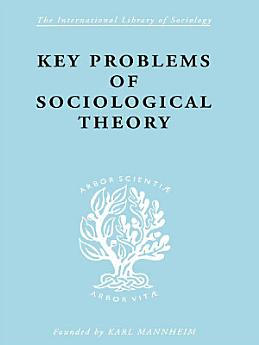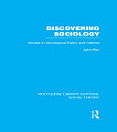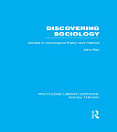এই ইবুকখনৰ বিষয়ে
This is Volume of VII twenty-two on a series on Social Theory and Methodology. Originally published in 1961, this book was written because of the author’s sense of the inadequacies of a sociological tradition dominated by empiricism and positivism. The tradition of empiricism leads to attempts to settle public issues by reference to crude ad hoc generalisations. So “right-wing” facts are refuted by “left-wing” facts and vice versa, and in the argument which ensues nothing becomes clear except the value-biasses which the authors seek desperately to conceal. The tradition of positivism on the other hand fails in refusing to interpret observed correlations of fact except in terms of the natural sciences. So the sociologist often appears to have derived little more insight through his precise methods than the untutored layman is able to do through trusting to intuition and common-sense.
এই ইবুকখনক মূল্যাংকন কৰক
আমাক আপোনাৰ মতামত জনাওক।
পঢ়াৰ নির্দেশাৱলী
স্মাৰ্টফ’ন আৰু টেবলেট
Android আৰু iPad/iPhoneৰ বাবে Google Play Books এপটো ইনষ্টল কৰক। ই স্বয়ংক্রিয়ভাৱে আপোনাৰ একাউণ্টৰ সৈতে ছিংক হয় আৰু আপুনি য'তে নাথাকক ত'তেই কোনো অডিঅ'বুক অনলাইন বা অফলাইনত শুনিবলৈ সুবিধা দিয়ে।
লেপটপ আৰু কম্পিউটাৰ
আপুনি কম্পিউটাৰৰ ৱেব ব্রাউজাৰ ব্যৱহাৰ কৰি Google Playত কিনা অডিঅ'বুকসমূহ শুনিব পাৰে।
ই-ৰীডাৰ আৰু অন্য ডিভাইচ
Kobo eReadersৰ দৰে ই-চিয়াঁহীৰ ডিভাইচসমূহত পঢ়িবলৈ, আপুনি এটা ফাইল ডাউনল’ড কৰি সেইটো আপোনাৰ ডিভাইচলৈ স্থানান্তৰণ কৰিব লাগিব। সমৰ্থিত ই-ৰিডাৰলৈ ফাইলটো কেনেকৈ স্থানান্তৰ কৰিব জানিবলৈ সহায় কেন্দ্ৰত থকা সবিশেষ নিৰ্দেশাৱলী চাওক।







